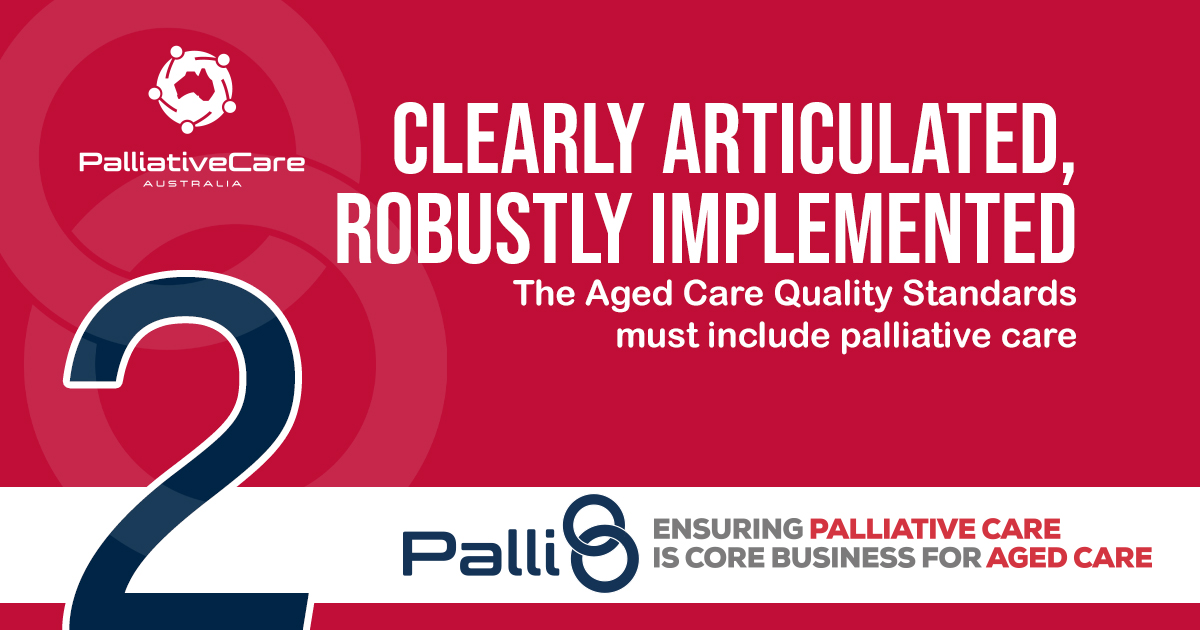Clearly articulated, robustly implemented. The Aged Care Quality Standards must include palliative care
Clearly articulated, robustly implemented. The Aged Care Quality Standards must include palliative care
Thursday, October 08, 2020
In our continuing series on PCAs Palli8 plan, we will look at the second recommendation ‘Clearly articulated, robustly implemented - the Aged Care Quality Standards must include palliative care’.
Commonwealth funded aged care services are required to comply with the Aged Care Quality Standards (the Standards) and have their performance assessed against the Standards. The Standards focus on outcomes for consumers and reflect the level of care and services the community can expect from aged care providers. They provide a framework of core requirements for quality and safety.
Unfortunately, the Standards do not include reference to the provision of palliative care as an outcome for consumers nor as a requirement for providers. The Standards include only two references to ‘end of life’, with Standard two focusing on end of life planning and Standard three on meeting the needs, goals and preferences of consumers nearing the end of life. Previously, palliative care was a standalone outcome under the Accreditation standards, Standard 2.9 Palliative care: The comfort and dignity of terminally ill care recipients is maintained (in use prior to 1 July 2019).
Aged Care Quality Standard 2(3)(b) Assessment and planning identifies and addresses the consumer’s current needs, goals and preferences, including advance care planning and end of life planning if the consumer wishes
Aged Care Quality Standard 3(3)(c)The needs, goals and preferences of consumers nearing the end of life are recognised and addressed, their comfort maximised and their dignity preserved.
The Palli8 Plan is underpinned by the belief that palliative care should be recognised as core business for all aged care providers. If palliative care is to become core business in aged care, then it should be recognised in the Standards and given appropriate focus.
If the Standards fail to include palliative care as a requirement, it will never become embedded in practice and could be overlooked by aged care providers and staff. As the Standards only refer to ‘end of life’, this severely restricts the care consumers may receive as this focuses providers on a period of time rather than the longer-term benefits consumers may receive from palliative care.
PCA commissioned KPMG to investigate the economic value of palliative care. The report, Investing to Save – The economics of increased investment in palliative care in Australia, recommended that the Aged Care Quality Standards be revised to include a specific palliative care standard, for the following reasons:
- Palliative care in residential aged care is often confined to the last hours of life and not systematically integrated into core business in residential aged care services.
- While the current Aged Care Quality Standards contain components of palliative care, the Standards do not effectively describe the expectations for palliative care in a holistic or systematic manner.
- In light of the clear need for palliative care for this population cohort, and the high degree of complex needs within residential aged care, the Standards should be altered such that they define what ‘good care should look like’, and include specific minimum competencies for palliative care.
PCA has further detailed the need for a palliative care standard in submissions to the Royal Commission into Aged Care Quality and Safety:
- Issues Overview – palliative care within aged care
- First submission to the Royal Commission into Aged Care Quality and Safety
- Submission to the Royal Commission into Aged Care Quality and Safety on the impact of COVID-19 on Aged Care Services
- Second submission to the Royal Commission into Aged Care Quality and Safety
Media release: Palliative care must become core business in aged care
